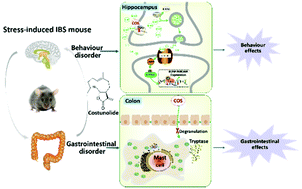Costunolide ameliorates intestinal dysfunction and depressive behaviour in mice with stress-induced irritable bowel syndrome via colonic mast cell activation and central 5-hydroxytryptamine metabolism†
Abstract
Irritable bowel syndrome (IBS) is a common chronic functional bowel disease, associated with a high risk of depression and anxiety. The brain–gut axis plays an important role in the pathophysiological changes involved in IBS; however, an effective treatment for the same is lacking. The natural compound costunolide (COS) has been shown to exert gastroprotective, enteroprotective, and neuroprotective effects, but its therapeutic effects in IBS are unclear. Our study explored the effect of COS on intestinal dysfunction and depressive behaviour in stress-induced IBS mice. Mice were subjected to chronic unpredictable mild stress to trigger IBS, and some were administered COS. Behavioural tests, histochemical assays, western blotting, and measurement of 5-hydroxytryptamine (5-HT) levels in the colon and hippocampus were applied to monitor the physiological and molecular consequences of COS treatment in IBS mice. COS administration relieved intestinal dysfunction and depression-like behaviours in IBS mice. Improvements in low-grade colon inflammation and intestinal mucosal permeability, inhibition of the activation of mast cells, upregulation of colonic Occludin expression, and downregulation of Claudin 2 expression were also observed. COS was also found to upregulate GluN2A, BDNF, p-ERK1/2, and p-CREB expression and 5-HT levels in hippocampal cells but inhibited 5-HT metabolism. Molecular docking showed that COS could form hydrogen bonds with the serotonin transporter (SERT) to affect the reuptake of 5-HT in the intercellular space. In conclusion, COS alleviates intestinal dysfunction and depressive behaviour in stress-induced IBS mice by inhibiting mast cell activation in the colon and regulating 5-HT metabolism in the central nervous system.



 Please wait while we load your content...
Please wait while we load your content...